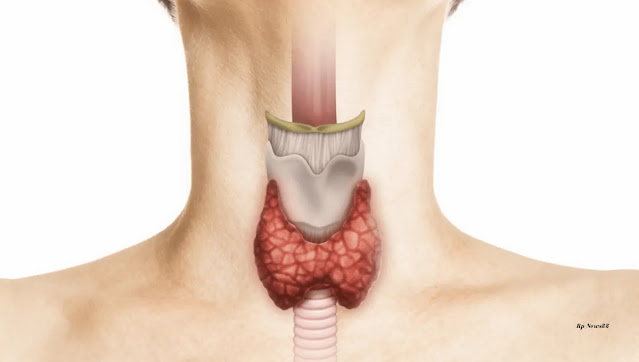Hyperthyroidism is a condition caused by an overactive thyroid, and it produces too much thyroxine hormone
Can Hyperthyroidism Be Cured?
Rp_News88..Hyperthyroidism is a condition caused by an overactive thyroid, which then produces a lot of the hormone thyroxine. The thyroid gland is part of the endocrine gland which is located in the lower front of the neck.
As reported by the Cleveland Clinic, Tuesday (19/10/2021) hyperthyroidism can affect the entire body, including making the metabolism faster.
#1. How to Reduce High Fever Fast Based on Age
In addition, the function of controlling body temperature to heart rate can also be disrupted by this health problem.
In fact, most cases of hyperthyroidism are curable. Disorders of the thyroid gland can be through surgery or routine medication.
However, hyperthyroidism needs to be treated very precisely and accurately.
So, the doctor will usually make a diagnosis of hyperthyroidism based on symptoms, physical examination, and blood tests to determine the appropriate medical action.
Hyperthyroid treatment
There are many treatment options for hyperthyroidism. Treatment also depends on the cause of hyperthyroidism.
Later, the doctor will discuss treatment options with you and help determine the best treatment plan. Treatment options for hyperthyroidism include:
#1. Headaches For 3 Days, What's the Cause?
1. Therapy with Medicine
Treatment with the antithyroid drug methimazole (Tapazole) or propylthiouracil (PTU), is the first line of treatment for hyperthyroidism.
Both work by blocking the thyroid's ability to produce hormones. These drugs are able to control the thyroid with more control.
2. Radioactive iodine therapy
Furthermore, radioactive iodine is an oral drug that is absorbed by overactive thyroid cells. Radioactive iodine damages these cells and causes the thyroid to shrink, causing thyroid hormone levels to fall for several weeks.
This usually causes permanent damage to the thyroid, which will cure the hyperthyroidism.
The amount of radiation given by the drug is different from the amount used for a radioactive iodine absorption test (RAIU), as well as a scan for diagnosis.
Most patients who receive this treatment must take thyroid hormone medication for the rest of their lives, in order to maintain normal hormone levels.
#1. 7 Eating Habits That Can Be The Cause of Fast Hunger
3. Surgical removal of the thyroid gland
Another treatment for hyperthyroidism is surgical removal of the thyroid gland (thyroidectomy). The procedure will cure the disease, but will usually result in an underactive thyroid.
Ultimately, patients need lifelong thyroid supplements to keep hormone levels normal.
4. Beta blocker therapy
This drug blocks the action of thyroid hormones on the body. Beta blockers themselves do not change the level of hormones in the blood, but can help control symptoms such as a fast heartbeat, nervousness and shaking caused by hyperthyroidism.
This treatment, however, does not stand alone and is usually paired with other options for treating hyperthyroidism in the long term.
#1. 4 taboos for people with high cholesterol, what are they?
How long does it take to treat hyperthyroidism?
The amount of time it takes to treat hyperthyroidism depends on the cause. If your doctor treats your condition with anti-thyroid drugs (methimazole or propylthiouracil), hormone levels should drop to healthy levels in about six to 12 weeks.
On the other hand, there are a number of risks of side effects from hyperthyroid medication, including:
Medicine side effects
Two drugs that can treat hyperthyroidism are methimazole and propylthiouracil (PTU).
One rare side effect that affects less than 1 percent of patients is the potential for liver damage.
Another side effect that is rare or less than 1 percent but serious is agranulocytosis, a severe decrease in the white blood cell count.
There is also the possibility of an allergic reaction to the medication, which occurs in about 5 percent of people.
#1. The Rarely Known Benefits of Eating Pineapple
Risk of exposure to radioactive materials
There are possible side effects of cancer after undergoing iodine therapy. However, this risk is considered low and unlikely.
One of the known risks is between pregnant or breastfeeding women and their babies. You should not take radioactive iodine while pregnant or breastfeeding, as it can affect the baby's thyroid gland.
Occasionally, patients may lose sensation in the mouth after radioactive iodine therapy which lasts for several months.
Postoperative side effects
There are always certain risks associated with surgery, such as infection and bleeding. Surgery is generally considered a very effective treatment for hyperthyroidism.
In rare situations, complications such as vocal cord paralysis (inability to speak) or damage to the parathyroid glands can occur, resulting in low blood calcium.
After treatment, the patient is likely to need thyroid hormone replacement treatment for the rest of his life. This is because some medications, especially surgery, reduce thyroid hormone levels to very low levels.
Get selected news updates and breaking news every day from: Rp_News88
#1. 4 Diseases Due to Mosquito Bites
#2. Various kinds of female climax, there are orgasms that last up to 15 minutes!
#3. Danger, Nap Turns Bad For Health
#4. Covid-19 Cases Explode Again, Early Symptoms of Omicron Not Fever
#5. These three Breakfast Menus Effectively Help Weight Lose
#6. 6 Benefits of Papaya Fruit According to Science
#7. What is liver cirrhosis, a disease caused by frequent drinking of alcohol?
#8. 10 Benefits of Eating Eggplant and Its Side Effects for Health!
#9. Recognize the Symptoms of Liver Disease that You Shouldn't Ignore
#10. How To Get Rid Of Or Treat Depression?



